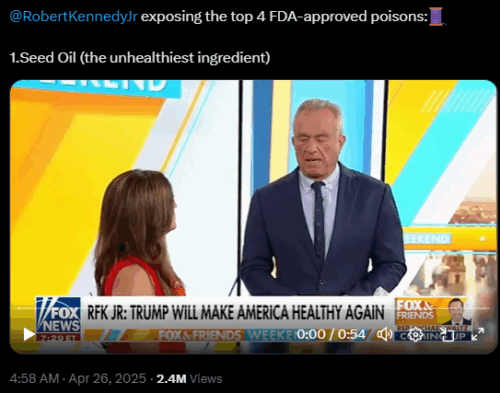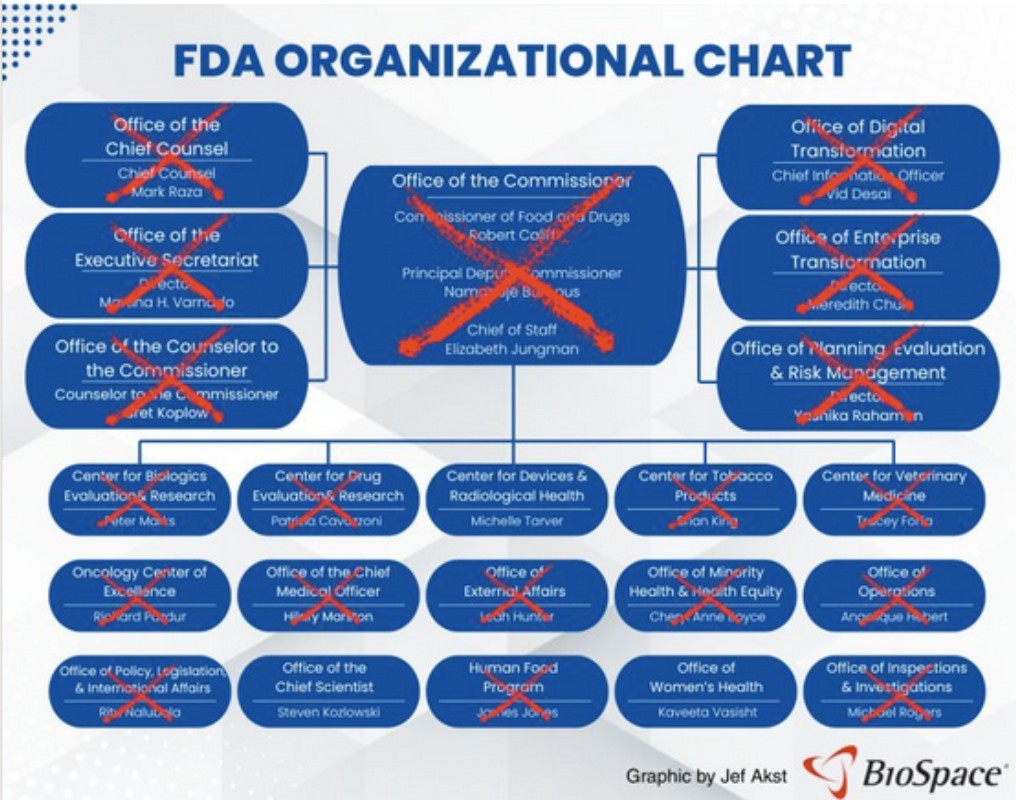Seed oils, according to Robert F. Kennedy Jr, are the unhealthiest ingredient in the food supply, not least because they are cheap and subsidized.

He also says they are one of the worst things you can eat.
Really? I don’t think so, although seed oils, like everything else high in calories, are best consumed in moderation.
OK. Here’s my understanding of what’s up with seed oils.
The basics
- They are essential in the human diet. We require two fatty acids, linoleic (omega 6) and linolenic (omega 3), best obtained from seed oils.
- All food fats, seed oils no exception, are mixtures of saturated, unsaturated, and polyunsaturated fatty acids; only their proportions differ.
- All food oils have about 120 calories per tablespoon; this is why fat is fattening.
- Unsaturated and polyunsaturated fatty acids, when substituted for saturated fatty acids, reduce blood cholesterol levels and heart disease risk.
On this last point, a recent epidemiological study, Butter and Plant-Based Oils Intake and Mortality, found:
- Higher intakes of canola, soybean, and olive oils was associated with lower total mortality (the investigators couldn’t find enough respondents who ate safflower or corn oils to study the effects of those oils),
- Every 10-g/d increment in plant-based oils intake was associated with an 11% lower risk of cancer mortality and a 6% lower risk of CVD mortality.
- Substituting 10-g/d intake of total butter with an equivalent amount of total plant-based oils was associated with an estimated 17% reduction in total mortality and a 17% reduction in cancer mortality.
Note: butter has a similar fatty acid composition to beef tallow. If they had studied beef tallow, I would expect the results to be similar.
The arguments against seed oils hold grains of truth but require explanation [my comments]
- We eat too much of them and with too much fried food [no argument on this one]
- Consumption increased from 1980 to 2000 in parallel with the rise in obesity [true, but so did calories from all other sources, and this is just an association].
- Their ratio of omega-6 fatty acids to omega-3 fatty acids is much too high [true for some seed oils, but not for olive, soy, or canola].
- Seed oils are extracted using hexane, a dangerous organic solvent [true, but processing removes most of it, and only slight traces remain. Still, it would be good if chemists could find “greener” alternatives].
- Highly unsaturated seed oils can become rancid quickly [true, which is why they need to be stored in dark bottles and refrigerated].
- Omega-6 fatty acids cause inflammation [not really, if anything, they are slightly anti-inflammatory but not by much; omega-3 fatty acids are somewhat more anti-inflammatory than omega-6’s, but that doesn’t mean omega-6s are terrible.
- They have too many calories and are mainly in junk foods [true, hence moderation].
One additional issue: replacing them
The soybean industry, clearly in its own self-interest, notes that a reduction in use of soybean, canola, corn, cottonseed, grapeseed, rice bran, safflower and sunflower oils, would likely see an increase in use of imported palm oil, which will raise food costs.
That’s not all it would do. As I’ve written previously, palm oil raises so many issues that it’s hard to know where to begin: unhealthy degree of fat saturation, deforestation, loss of biodiversity, child labor, labor exploitation, adulteration, and criminal behavior, with everyone who consumes products made with palm oil wittingly or unwittingly complicit in these problems. See, for example, Jocelyn Zuckerman’s Planet Palm: How Palm Oil Ended Up in Everything—and Endangered the World.
Comment
I cannot find convincing data that seed oils are any worse for health than any other high-calorie food, and the evidence for their benefits as compared to animal fats seems strong and consistent. Getting them out of the food supply could help reduce calorie intake, but only if they are not replaced by other fats. Using seed oils is healthier than using more saturated fats.
But all of this has to be understood in the context of calories and everything else in the diet. Seed oils on salads make a lot of sense.
If you are still worried, there is always olive oil. Olives are a fruit, not a seed.




